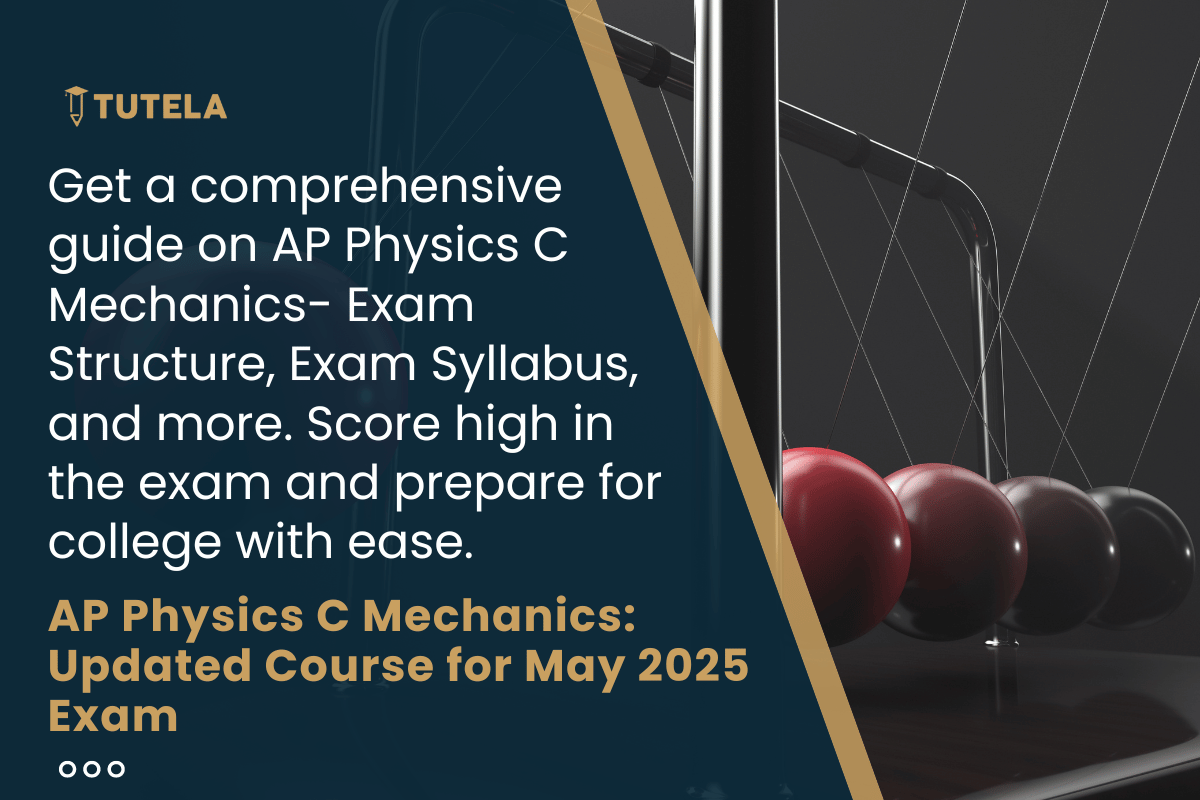
Hello, students. Whether you're preparing for the AP Physics C Mechanics exam or are just interested in understanding classical mechanics, this guide will help you understand what the AP Physics C Mechanics course covers. The AP Physics C: Mechanics exam for May 2025 has undergone some changes. We have incorporated these changes below. The AP Physics C: Mechanics Exam is on 14th May 2025.
In this blog, we aim to be the student's go-to guide, breaking down the entire syllabus of AP Physics C: Mechanics in a concise and engaging manner. From fundamental principles to advanced concepts, we'll navigate the intricacies of classical mechanics.
| Unit Name | Topics Covered | Weightage in the Exam |
| Unit 1: Kinematics |
| 10-15% |
| Unit 2: Force and Translational Dynamics |
| 20-25% |
| Unit 3: Work, Energy, and Power |
| 15-25% |
| Unit 4: Linear Momentum |
| 10-20% |
| Unit 5: Torque and Rotational Dynamics |
| 10-15% |
| Unit 6: Energy and Momentum of Rotating Systems |
| 10-15% |
| Unit 7: Oscillations |
| 10-15% |
The AP Physics C: Mechanics exam for May 2025 has undergone some changes. The updated structure is as follows:
Section I: Multiple-Choice Questions (MCQs)
Section II: Free-Response Questions (FRQs)
Types of Questions:
General Changes
The knowledge gained from AP Physics C: Mechanics opens doors to various majors and fields. Whether you're intrigued by engineering, physics, or a related discipline, this course equips you with a solid foundation.
1. Physics and Astrophysics: Mechanics lays a solid foundation for students pursuing majors in physics and astrophysics, providing essential principles for understanding the fundamental laws governing the universe.
2. Mechanical Engineering: With a focus on mechanics, the course aligns perfectly with the curriculum of mechanical engineering majors, offering a comprehensive understanding of forces, motion, and energy.
3. Civil Engineering: Understanding structural mechanics is crucial in civil engineering, making AP Physics C: Mechanics beneficial for students aspiring to contribute to the design and construction of infrastructure.
4. Aerospace Engineering: Those aiming for careers in aerospace engineering benefit from the course's coverage of mechanics, which is fundamental to the design and operation of aircraft and spacecraft.
5. Computer Science and Engineering: The analytical and problem-solving skills developed in AP Physics C mechanics complement the requirements of computer science and engineering majors, contributing to success in software and hardware development.
6. Electrical Engineering: Concepts of motion and forces are applicable in electrical engineering, making the course valuable for students interested in understanding the behavior of electrical systems.
7. Applied Mathematics: The integration of calculus in AP Physics C mechanics provides a strong mathematical background, beneficial for students pursuing majors in applied mathematics, where mathematical modeling is essential.
8. Biomechanics: AP Physics C: Mechanics provides relevant insights for biomechanics majors interested in the intersection of physics and biology, particularly in understanding the mechanics of living organisms.
9. Materials Science: Mechanics plays a crucial role in materials science, and students exploring this field can benefit from the foundational knowledge offered in AP Physics C mechanics.
10. Environmental Engineering: The course's focus on forces and energy is relevant to environmental engineering, where understanding the impact of human activities on the environment is essential for sustainable practices
TutelaPrep’s College Navigator allows students to search for colleges based on their preferred country and course. Not only that, it also provides valuable insights into each college’s specific admission requirements for those exams. Through College Navigator, you can even connect with alumni at your chosen colleges to get a firsthand feel for campus life and academics.
We hope this article helped you with the subject knowledge. Reach out to us by filling out our assistance form if you need any help with the preparations.